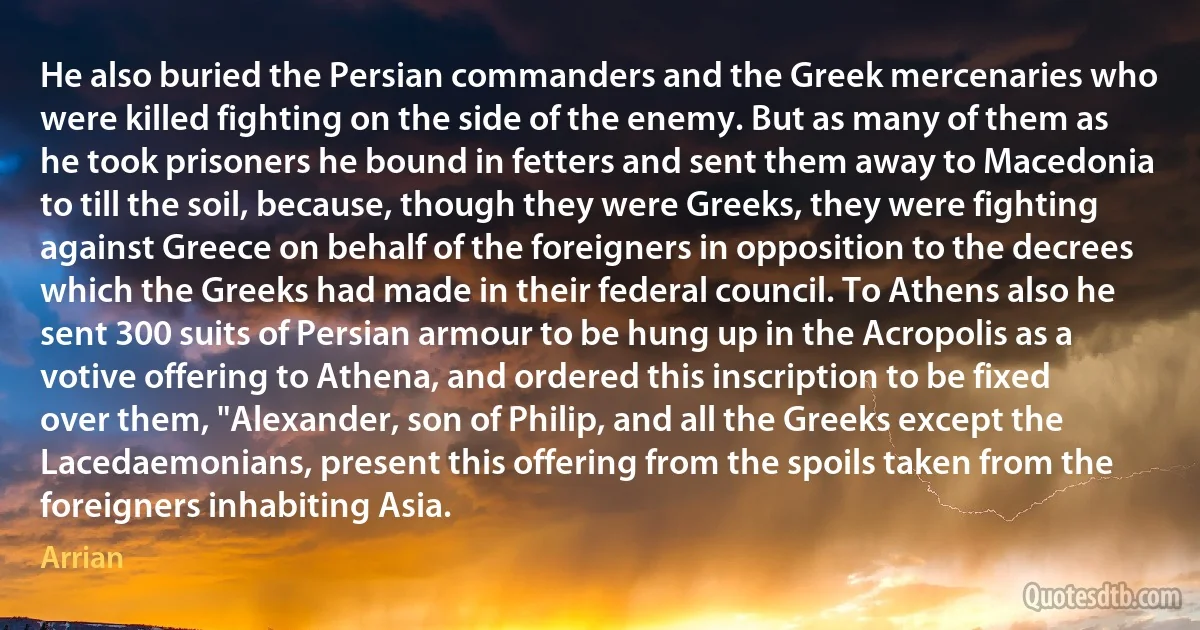
He also buried the Persian commanders and the Greek mercenaries who were killed fighting on the side of the enemy. But as many of them as he took prisoners he bound in fetters and sent them away to Macedonia to till the soil, because, though they were Greeks, they were fighting against Greece on behalf of the foreigners in opposition to the decrees which the Greeks had made in their federal council. To Athens also he sent 300 suits of Persian armour to be hung up in the Acropolis as a votive offering to Athena, and ordered this inscription to be fixed over them, "Alexander, son of Philip, and all the Greeks except the Lacedaemonians, present this offering from the spoils taken from the foreigners inhabiting Asia.
ArrianRelated topics
bound bury enemy federal fighting greece hang philip present sent side soil son take till votive asia athena macedonia spoilsRelated quotes
Voulagris asked me to find film funding for what was to be the last but unfinished film project of Elia Kazan, a personal friend of Voulgaris. The subject of the film was the immigration of the Kazan family from the beleaguered Greek minority communities under Turkish rule in Asia Minor to the safe haven of the USA where the Kazan family settled. I arranged a meeting between Elia Kazan and the London based film financier Frixos Constantini of Poseidon Films at the Grand Bretagne Hotel in Athens. What followed from this meeting is that Mr Constantini put Elia Kazan in touch with Martin Scorsese a personal friend of Mr Constantini and who also runs the production company Cappa films. And so it was that these two giants of US cinema met for the first time.

Angelique Rockas
In the year AH 710 (AD 1310), the King again sent Mullik Kafoor and Khwaja Hajy with a great army, to reduce Dwara Sumoodra and Maabir in the Deccan, where he heard there were temples very rich in gold and jewels... They found in the temple prodigious spoils, such as idols of gold, adorned with precious stones, and other rich effects, consecrated to Hindoo worship. On the sea-coast the conqueror built a small mosque, and ordered prayers to be read according to the Mahomedan faith, and the Khootba to be pronounced in the name of Allaood-Deen Khiljy. This mosque remains entire in our days at Sett Bund Rameswur, for the infidels, esteeming it a house consecrated to God, would not destroy it.

Firishta
In the year AH 710 (AD 1310), the King again sent Mullik Kafoor and Khwaja Hajy with a great army, to reduce Dwara Sumoodra and Maabir in the Deccan, where he heard there were temples very rich in gold and jewels' They found in the temple prodigious spoils, such as idols of gold, adorned with precious stones, and other rich effects, consecrated to Hindoo worship. On the sea-coast the conqueror built a small mosque, and ordered prayers to be read according to the Mahomedan faith, and the Khootba to be pronounced in the name of Allaood-Deen Khiljy. This mosque remains entire in our days at Sett Bund Rameswur, for the infidels, esteeming it a house consecrated to God, would not destroy it.

Alauddin Khalji
For all the ‘4th Generation of War' intellectuals running around today saying that the nature of war has fundamentally changed, the tactics are wholly new, etc., I must respectfully say, ‘Not really': Alexander the Great would not be in the least bit perplexed by the enemy that we face right now in Iraq, and our leaders going into this fight do their troops a disservice by not studying - studying, vice just reading - the men who have gone before us. We have been fighting on this planet for 5,000 years and we should take advantage of their experience. ‘Winging it' and filling body bags as we sort out what works reminds us of the moral dictates and the cost of incompetence in our profession.

James Mattis
Religious beliefs are counterfactual insofar as they are anomalous (e. g., God is gendered but sexless; Saturn devours his own children; lambs lie with lions), implausible (e. g., Athena bursts forth from Zeus's head; the Zai:rean Nkundo hero Lianja springs fully armed from the leg of his mother; Lao-Tse either emerges with his white beard from the left side of his mother, who bore him for eighty years, or is born immaculately of a shooting star), and, most significantly, counterintuitive (e. g., the Judea-Christian God is a sentient and emotional being with no body; Greek, Hindu, Maya, and Egyptian deities are half-human half-beast; the Chinese monkey god can travel thousands of kilometers at one somersault).

Scott Atran
